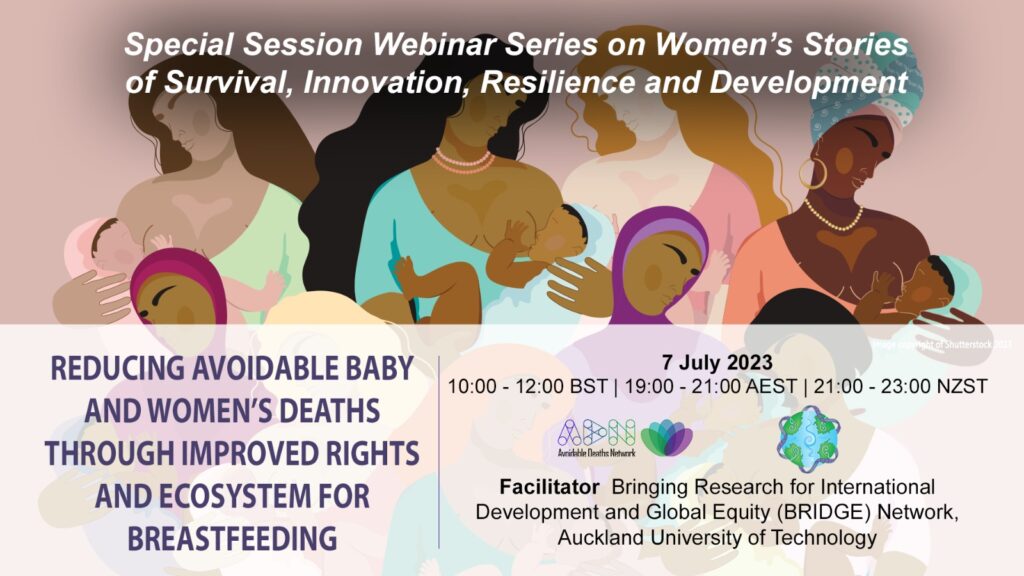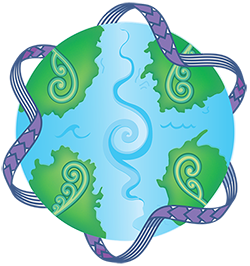ADN Special Session: Reducing Avoidable Baby and Women’s Deaths Through Improved Rights and Ecosystem for Breastfeeding

On Friday 7 July 2023 at 10:00 BST (UK) and 19:00 (NZT), 21:00 (AEST) we hosted a Special Session webinar in collaboration with Auckland University of Technology’s Bringing Research for International Development and Global Equity (BRIDGE) Network to highlight the growing barriers to breastfeeding globally and what steps can be taken to dismantle the structural constraints to breastfeeding in low-middle- and high-income countries.
We brought together three world-class researchers who present innovative tools for policymakers, advocates, and media that count human milk production in economic statistics, highlighting the importance of women’s unpaid work in our national budgets. These tools also showed the return on investment for countries in supporting breastfeeding ecosystems and the costs of not enabling women’s and children’s rights to breastfeeding.
We as scholars and practitioners sought to highlight the issue of structural barriers to breastfeeding and tools for policymakers, advocates and media to use to build a breastfeeding ecosystem and support women’s and children’s rights.
More concretely, the expert panel aimed to:
- Highlight the invisibility of women in economic systems and raise breastfeeding on the policy agenda;
- Identify productivity supports (formal and informal) for gender-responsive budgeting that will prevent avoidable deaths of women and children; and
- Introduce innovative tools for calculating the economic benefits of breastfeeding in low-, middle-and, high-income countries.
Concept Note
Panel format
The panel was structured as a brief presentation from the panel speakers (20 mins each) followed by questions and answers (Q&A) from the audience. The Q&A was moderated by Dr. Sari Andajani and Ms. Eilidh Thorburn.
Speakers’ Bios

Dr. Julie Smith is an Honorary Associate Professor and awarded ARC Future Fellow at the Research School of Population Health, ANU. She is also a Fellow at the Crawford School of Public Policy’s Tax and Transfer Policy Institute.

Alessandro Iellamos the senior emergency nutrition adviser for Family Health International 360 (Fhi360) supporting and a maternal, infant, and young child nutrition specialist. He has extensive expertise in nutrition and infant and young child feeding (IYCF) policies and practices, particularly in emergencies, the WHO International Code, Baby Friendly Hospital Initiative (BFHI), the Operational Guidance for Infant and Young Child Feeding in Emergencies and other global tools. He has worked with the WHO’s Scientific and Technical Advisory Group (STAG) on the International Code and assisted the International Baby Food Action Network with the development of the World Breastfeeding Trends Initiative (WBTI) and the World Breastfeeding Costing Tool (WBCi) and IYCF policy tools.

Andini Pramono is an International Board Certified Lactation Consultant (IBCLC) and in her final year of PhD at the Australian National University. Her PhD research is looking at the facilitators and barriers of Baby Friendly Hospital Initiative implementation in Indonesia and Australia. She has been volunteering with the Indonesian Breastfeeding Mothers Association since 2012, and now involve with Australian Breastfeeding Association and World Breastfeeding Trend Initiative (WBTi) Australia.
YouTube
Unanswered Question
| Question | From | To | Answers |
| What role can healthcare professionals, community organizations, and support networks play in assisting breastfeeding mothers during and after disasters? | Sari Andadjani | Alessandro Iellamo | Each member of the community, health care system and organizations have a role to play. I would like to emphasize on the preparedness part, where communities, health care systems and professionals together with organizations and networks can work towards ensuring that the capacity to protect, promote and support IYCF and breastfeeding practices are in place. Advocate for resources and initiatives like the setup of safe spaces during emergencies with the support of skilled breastfeeding counsellors to be included in emergency response plans at all levels, community, city, regions, districts etc. During emergencies we have to ensure that we identify and support all women with infants and young children. Set up the spaces, provide the confort and skilled support, called for resources to be invested in IYCF and breastffeeding support, don’t and I repeat don’t call for infant formula donations, but purchase the quantity needed (if needed) and ensure that trained health professionals supports the mothers and monitor the mother and the child. Heath professionals also during an emergency have the responsibility to protect and support breastfeeding, but they need to be trained and have the capacity and resources to do. Campaigns, messages, initiatives, appeals should mobilize resources so that all women and their infants and young children can access safe and timely IYCF and breastfeeding support, even infant formula with clean water and other paraphernalia if and when needed. |
Impact
Participants: 46
Feedback:
| No. | Feedback | Name | Institution |
| 1 | Thank you to the organisers for this invitation to speak today… | Dr. Julie Smith | ANU |
| 2 | Thank you for the invitation and this inspiring talk | Allessandro Iellamo | Fhi360 |
| 3 | Thank you for the opportunity to speak in this webinar … | Dr. Andini Pramoni | IBLC |
| 4 | Thank you to all three presenters- it was a learning session. Also, thanks to the organizing team! | Shabnam Jalili – Moghaddam | AUT |
| 5 | Thank you for organising this session. It was very interesting, and I learned a lot from the presenters | Dr. Ayse Yildiz | University of Leicester |
| 6 | The Sessions were very interesting. The presentation was fine. Thanks | Jagriti Chowdhury |
Poll Results:

More Information
Website: bridgenetworkglobalequity.org
LinkedIn: BRIDGE Network for Global Equity
YouTube: bridgenetworkglobalequity
